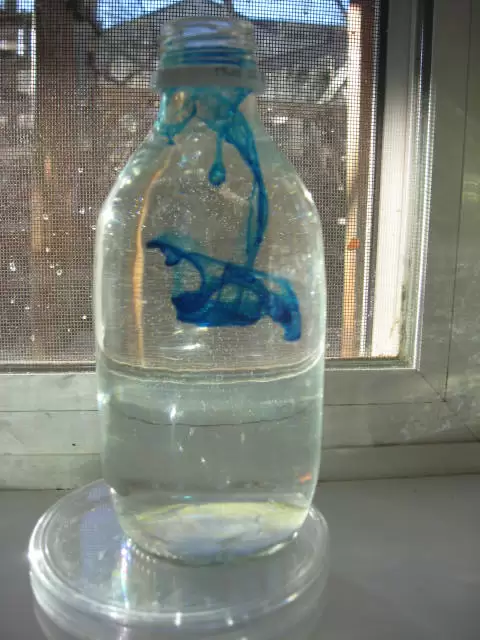We began with a small bottle of clear water, an ordinary object. I explained that even the most ordinary things can be amazing, if we observe with care, consider what we see, and try to explain the details to ourselves. Then I had them watch as I put a single drop of blue coloring into the top of the water, and students observed the behavior of this ordinary event at close range. Their comments were animated and insightful. As we watched the beautiful, exotic forms appear in the glass, we began to evaluate what drove the changes that became apparent. We discussed why not all the color went to the same place; why some of it remained in the middle, stationary, while some went directly to the bottom. We talked about the familiar shapes which seemed to mimic shapes of jellyfish in the ocean. I asked them what they guessed would happen over time; some believed it would stabilize, others thought it would all end up at the bottom, some even felt it would disperse to fill the bottle.
While we waited, we tried something else. We filled small vials half full of water, then added a mysterious unknown to each vial and watched the interaction, which was, at first, quite disappointing. Having already given them significant guidelines for safety, I informed them that this time they could put a thumb over the top and shake the bottle. “Wow!”, they said, as the vessel became murky and filled with small particles. We carefully wafted the scent toward noses by prescribed techniques, and some of them began making guesses that it was salt water. We finally took the allowed taste test with a toothpick, and got their hypothesis confirmed. It was salt water, but more interesting than they had previously considered.
By then, we went back to our first experiment, which by now had indeed turned the entire bottle a lovely cerulean blue, confirming one set of hypotheses, refuting others. So I asked them what would happen if I took a large bottle of salt water to Bridgewalk pond, which we have previously visited. They shouted that it would get into the whole pond in time, and not be good for the living things there. Further discussion of “stuff that gets put in our water” was lively and enlightening.
We have started other experiments in a similar vein; keeping to the familiar, practicing appropriate techniques, observing carefully, discussing the our ideas and some principles to guide us. We haven’t resorted to the spectacular images of You Tube and various “science” shows. We have worked with substances that students encounter in their own lives. They were still interested when an “unknown” (pepper) refused to mix in a dish of water, and then excited when a single touch of a second “unknown” (soap) caused an instantaneous retreat of the pepper to the edges of the dish and refused to react further, but sank to the bottom. This led to presentation of the ideas of polar and non polar substances, as well as the importance of the use of soap (including before eating lunch or snack). It also led to the importance of soap as an agent that has changed human history and extended human lifetimes.
Chemistry is the study of change, at the molecular level, of the familiar into the astounding, which is the bridge between the physical rules of reality and the complexity of biological manifestation within the environment. It is not simple, but humans have ferreted out some of the secrets in our journey, and used them to enhance our lives, as well as use them for more dubious purposes, whether intentionally or not. Understanding how nature works at this subtle level requires imagination and dedication, but humans possess both. Making choices about applications of knowledge can also be challenging, but it is also part of learning to take responsibility for our own actions.
Many grownups I know “gave up” up on the sciences because they were complicated, difficult, or “boring” classes, full of challenging language, and some mathematics. Often chemistry classes were the breaking point for those students. Today, there are many media presentations of “flashy reactions” or “thrilling explosions” available to anyone. I understand the reasons students always ask if they “can blow things up”. “Extreme” is the signature adjective of our time. I don’t consider it the best adjective when applied to most human behavior, but maybe I am just too old fashioned.
These students know I have some proficiency in exotic uses of chemistry. I have taught classes in rocketry for various ages for over thirty years, including at Bixby in my early years, and for the last two summers. Chemical and nuclear fuels are the only practical method we have of getting out of the gravity well we inhabit. But these students also know there are procedures and safety precautions that are demanded in those endeavors. I appreciate exciting shows too, but not at the risk of the actual miracles that each of my students embody. I have experience with explosions and lab mishaps that are real, not fictional, and that is not what these young wonders are ready for.
I did not give up on science, though I was not the star of my classes, and it was not easy for me in many ways. What was important to me was the revelation of beautiful patterns in nature; complexity displayed wonder, and the simplest interactions generated intense recursive sophistication in reality. That we odd collections of protoplasm could understand the intricacies of Nature’s tapestry was a worthy endeavor to me. I had to start small, with simple concepts I could manage, and connections I could fathom. Each small step led to many pathways, and the direction chosen did not always lead back to the crossroads. Still, I have found it possible to make new maps across some chasms as I learned new implementations for those simple first concepts. The same pattern of notes is repeated in various tempos and scales.
That is why we are starting our study of chemistry with simple pieces; familiar, but offered in a slightly different frame, hopefully with enough room for new perspectives and appreciation. We will work with the substances of their own lives, and train their own hands before we jump to the higher levels. I will not require them to memorize the periodic table, but hope they learn to appreciate its value as a map of the essence of the universe they belong in. Dramatic changes will be part of the experiments, but we won’t be making internet videos for major networks. I hope they learn enough to understand the process of cooking food. I hope they learn that their own energy comes from chemical interactions that begin in the Sun. I hope they learn enough to understand what should be allowed in their water supply. I hope they learn that they are chemical creatures, subject to change, and that they have choice about some of those changes. If some of that occurs, they will be better prepared for other adventures as well.



